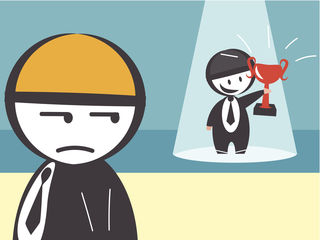Jealousy
5 Telltale Signs That You’re the Target of Envy
Red flags of the green-eyed monster.
Updated April 24, 2024 Reviewed by Gary Drevitch

If you’ve ever earned recognition for a significant accomplishment or milestone, you’ve probably been blindsided by disappointment that your victory didn't move everyone who witnessed the sacrifice and work ethic it demanded. Without warning, even the people who love us most can sometimes grow envious of us, and just as unexpectedly, so can people who barely know us at all.
And worse, being a modest person who doesn’t flaunt coveted material possessions or status symbols doesn’t necessarily protect you from being targeted. When you possess certain enviable personal characteristics that garner attention—traits like charisma, creativity, or self-discipline—simply being yourself is enough to make some individuals resent you.
Below I delve into several telltale signs of envy and unpack the psychological underpinnings of these red flags. Each analysis offers an explanation of why and how comparison, competitiveness, insecurity, and narcissism often get the best of people who are particularly susceptible to envy. In many instances, their low self-worth often masked as bravado or condescension, stirs up unnecessary conflict and tension.
If you’re being targeted by envy, you've probably wondered why said person spends more time diminishing you than addressing their own low self-esteem and working toward inner fulfillment and self-empowerment. The examples here provide insight into just how disempowered and irrational envy can render some individuals.
1. They step out of character when others compliment or congratulate you.
Envy is such a common and universal emotion, even the angels amongst us are susceptible to it. It doesn’t help that by selling illusions of perfection, the beauty and media industries plant a degree of insecurity in all of us.
The implication for recognizing envy in others is that they probably aren't known as bullies. Instead, their envy may manifest as a reaction to you that often seems totally out of character. In social settings, you’ve probably never seen them bully others, and they might even treat you cordially. However, you might also notice that a switch flips when others shower you with attention. As everyone else enthusiastically compliments or congratulates you, they suddenly appear expressionless or seem annoyed and impatient.
Heraclitus said, “Our envy lasts longer than the happiness of those we envy." Yet, for individuals susceptible to envy, triggered insecurities can make a single moment feel inescapable, so much so that they quickly lose perspective, react in fight-or-flight mode, and noticeably step out of character.
2. They’re committed to scrutinizing your work—and misunderstanding your intentions.
In an effort to flip the power imbalance in their minds, a desperation to upstage their target can drive some folks susceptible to envy to justify relentless scrutiny and bullying behavior. They often seem to wait eagerly and patiently for their target’s humiliating slip-ups, especially public ones, and seize every opportunity to correct and condemn them.
Once they “catch” or “trap” their targets, a common tactic is to pathologize them. This often looks like rebuffing their target’s sincere efforts to apologize or take responsibility, as well as disproportionately attributing fault to their character or intelligence, rather than legitimate context––also known as the fundamental attribution error. The goal is to rationalize their target’s supposed disposability, and their own supposed superiority, by stripping their target of the complexity, contradiction, fallibility, and nuance inherent to being human.
Their commitment to misunderstanding their target leaves no room for grace. And particularly in positions of authority and power, they may force their target to jump through endless hoops, setting higher and higher standards, without any intention of ever being satisfied.
3. They use ad hominem attacks and stereotypes to discredit or underestimate your intelligence, skills, and/or talent.
What happens when even a destructively envious person's sharp deficit lenses can’t detect any flaws in their target’s character or work? Or, when their target seems to rise to the challenge, every time they raise the bar unfairly? They then usually begin attacking personal traits that have nothing to do with whatever they envy about their target, even resorting to bigotry.
For instance, a male writer who envies a prolific feminist writer might publicly question whether she’s deserving of recognition or inclusion in the canon, on the basis that her 10 best-selling books focus exclusively on gender. Yet, there's no correlation between genre and a writer's skill. An established singer might point out that a young, popular musician lacks formal training, or doesn’t have the right “look," though they clearly don’t need either to attract acclaim.
An envious person who can’t find legitimate “flaws” in their target will detract from their target’s likability, or attempt to humble them, by wielding any criticism. That their criticism might be biased or irrelevant is beside the point.
4. They romanticize your life or assume they're more deserving of your success because you've struggled less.
Those who assume your life and success have been effortless usually never get as happy for you as you’d expect, because, to begin with, they can’t see what’s notable about your accomplishments, growth, or progress. In particular, those who feel ashamed about who they are, and hate their own lives, will only ever be able to myopically scrutinize your luck or privilege, even when they themselves benefit from advantages you’ve never been afforded.
The same usually holds true for people who struggle to humanize the ones they idealize. It’s usually unclear that their admiration borders on envy, until the object of their affection asserts a boundary or opinion that challenges their romanticized projections. Suddenly, they swing to the opposite extreme.
And as for your hard-earned wins, they never seem to grasp the courage, discipline, and sacrifice that went into bringing your dreams to fruition. They're prone to assuming your life path has been obstacle-free.
5. They diminish you while copying your characteristics, style, or work.
An ironic trait of those susceptible to envy is that they often copy the very things they critique about their targets, as they’re always paying close attention, and are often competitive and desperate for validation. In fact, research proves that envy can increase the likelihood of correctly remembering details about an envied person, much more than for someone not envied, even to the point that envy interferes with rational cognition (Hill, DelPriore, & Vaughn, 2011).
Consequently, competitive individuals who strive to be admired or envied themselves might exhibit the paradoxical behavior of copying the habits, style, or work of targets they undermine. In an effort to rid themselves of feelings of inadequacy, without having to address underlying issues, they become preoccupied with social comparison of their own status against their target’s perceived worth. The end result is oneupmanship, which often plays out as them working hard to "keep up" with their target, and using the target they diminish in private as the same criteria for elevating their public or social image.
Araya Baker is a counselor educator, suicidologist, and policy analyst. Baker holds a M.Phil.Ed. in professional counseling from the University of Pennsylvania Graduate School of Education and an Ed.M. in human development and psychology from the Harvard Graduate School of Education. Learn more at arayabaker.com.
References
Hill, S., DelPriore, D. & Vaughan, P. (2011). The cognitive consequences of envy: Attention, memory, and self-regulatory depletion. Journal of Personality and Social Psychology, 101(4) 653-666.
Source: DepositPhoto
Source: DepositPhotos




